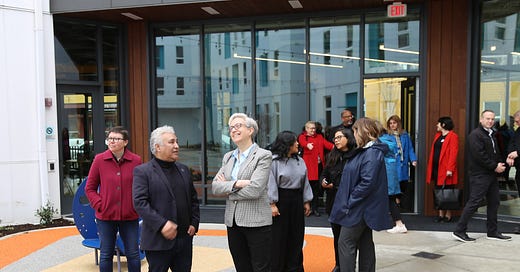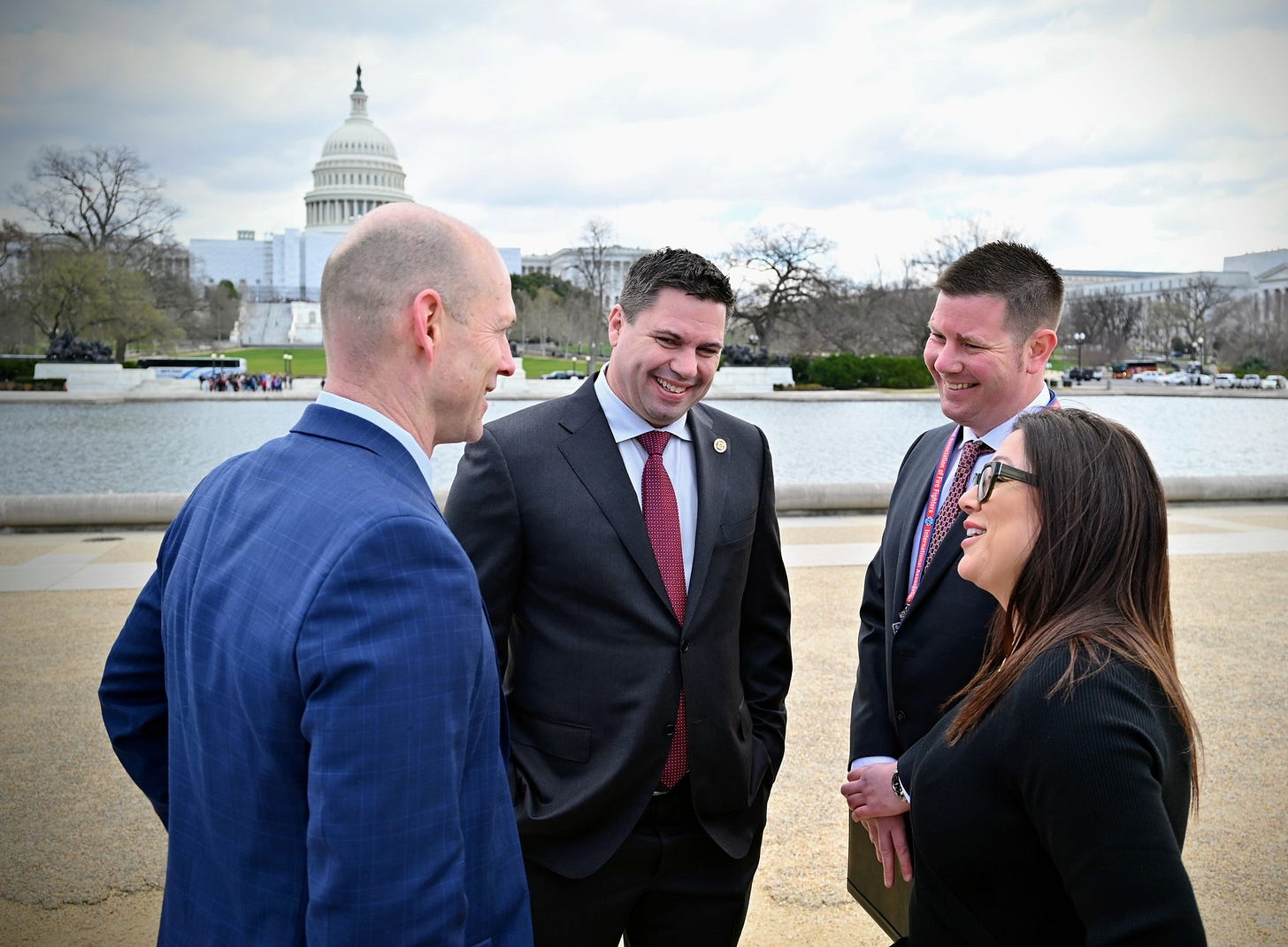The Liftoff: Kotek appoints two new state executives
PLUS: What Betsy Johnson's up to; Oregon has a new political party; prominent conservative Oregonians on the move; huge housing proposals advance; new potential challenger to DA Schmidt; and more!
Welcome back to The Liftoff!
As we say every week: Thank you for all the love! Our goal is to be your top source every Monday morning on Oregon politics, the legislature and state and local government.
Are you looking for a job? We’re looking for a full-time content director. email Alex (alex@or360.org) a copy of your (or someone else’s) resume if interested!
If you like what you see, we hope you will consider upgrading your subscription (it’s $10 a month)! Your support allows us to keep doing what we’re doing—and expand our work.
1. A big week for housing (and the Kotek Administration)
Governor Kotek’s big housing request moves forward. Last week, we reported that Kotek directly appealed to the legislature for $155 million to reduce homelessness. On Tuesday, a budget subcommittee advanced both House Bills 2001 and 5019, which fully fund the Governor’s request—and more.
Specifically, OPB reports that the bills would fund $200 million to build more affordable housing, and help prevent those who are on the cusp of homelessness from losing their housing. The measures also re-thinks Oregon’s generation-old approach to building housing.
Next up? An up-or-down vote in the House and Senate as early as this week.
The Oregonian’s Sunday feature story is on Governor Kotek’s first 60 days—including her sprint to address homelessness.
Reporter Hillary Borrud writes, “A sprinter on her high school track team, Kotek said her administration probably needs to downshift to a sustainable pace soon ‘but it’s really important for people to see us working hard to set the foundation.’”
Last week, Kotek tapped her second interim director of the Oregon Health Authority—this time, an internal candidate: CFO Dave Baden.
Additionally, the state’s top budget official resigned (unexpectedly, according to some)—Kotek tapped Kate Nass as Oregon’s next Chief Financial Officer.
Portland selects California non-profit to run the first city-run mass tent encampment. Urban Alchemy has been selected to manage Portland’s first city encampment, which will open in August. Portland Mayor Ted Wheeler said he hopes the encampment will grow into six future large encampments.
According to The Oregonian, “The encampments are part of a controversial homelessness plan first announced by Wheeler and Commissioner Dan Ryan in November that could eventually lead the city to ban street camping.”
Also of note: “The city did not say how much the site will cost to build and operate, though in its bid for the project, Urban Alchemy said it would cost $5.1 million a year to operate a 150-person site and an additional $400,000 for startup costs. That estimate did not include the cost of meals, utilities or the construction of the site, which the city has committed to cover.”
Bend’s plan to fund a managed camp abruptly fell apart: Two Deschutes County Commissioners voted against funding a managed camp in south Bend after originally verbally agreeing to partner with the city of Bend on the project. The agreement would have used federal funding to pay for services at a city-owned site on Highway 97. Hours later, Bend Mayor Melanie Kebler blasted the two commissioners for backing out of the deal—saying at a press conference she was “shocked and dismayed.”
Could Eugene’s CAHOOTS be in trouble? The Register Guard digs into the Eugene Police’s request for crisis response services. CAHOOTS, or Crisis Assistance Helping Out On the Streets, has worked in Eugene for decades, but a recent consultant said CAHOOTS has become overburdened and inefficient.
Why should you care? Because the Portland Street Response is based on a similar model, which dispatches paramedics and crisis counselors to emergency calls dealing with issues like housing, drug counseling, and non-urgent medical attention.
2. Changes brewing in Portland
Portland’s Ritz-Carlton gamble: The Oregonian’s veteran investigative reporter Jeff Manning dug deep into public records and other accounts to answer this high stakes question: Will developers of the new $600 million Ritz-Carlton be able to sell the 138 condos at “at price tags never before seen in Portland” and attract guests at the city’s first five-star hotel? Only time will tell.
Also of note: The developer signed an agreement with the city indicating they would comply with Portland inclusionary zoning rules by making 20% of the units affordable…but instead may pay a $7.7 million fine.
Prominent Portland restaurateur, Lisa Schroeder (who owns Mother’s Bistro), did not mince words on her recent Portland Business Journal cover story:


Longtime Multnomah County prosecutor Nathan Vasquez, confirmed to The Oregonian Wednesday that he is considering running for Multnohmah County district attorney, pitting him against his boss DA Mike Schmidt.
3. Mayor David Drotzmann’s on solving the urban-rural divide
In this episode, Hermiston Mayor David Drotzmann explains why one-size-fits-all policy solutions don’t always work for rural Oregon, the challenges of small town politics, and how nonpartisan local government can help solve for the new era of partisan divisions.
Worth noting: Drotzmann lives in Senator Bill Hansell’s senate district—and Hansell recently announced he wouldn’t seek reelection.
4. Sponsored Message from Harrang Long P.C.: Harrang Long’s Government Relations Practice
This message is from our sponsor, Harrang Long P.C.
The 82nd Legislative Assembly is well under way, with bills working their way through committees as even more bills are introduced. Action by this year’s legislature will touch the lives of every Oregon resident, business, non-profit, and local government. As a law firm, Harrang Long P.C. has always recognized that achieving our clients’ goals sometimes requires a change in the law. And in other situations, clients need help stopping or changing proposed amendments to the law that put their interests at risk.
For decades, we have played a role in shaping Oregon law on many subjects, from narrow regulations to major policy changes implicating billions of dollars. Our lawyers work with clients to draft legislation, prepare legal opinions and testimony to share with legislators, coordinate with professional lobbyists, and work directly with policymakers. To learn more about Harrang Long’s Policy and Politics Practice, click here.
5. An alcohol tax proposal, voting rights for people in prison, and other headlines from Salem
One tax that might be hard to raise: Oregon’s beer taxes are 45th in the country. Recovery advocates are trying to pass HB 3312, which would raise alcohol taxes, with beer taxes going from $2.60 per barrel in 2023 to $33.60 per barrel by 2028. The Oregon Beverage Industry opposes the taxes, but advocates say raising the price of alcohol would reduce consumption and provide a funding stream for recovery services.
Should people in prison be allowed to vote? Some legislators are advancing a proposal to do just that.
Farmers and environmental advocates packed a legislative hearing on a SB 85, which would make the Oregon Department of Agriculture stop issuing new permits for big animal operations (those with several thousand animals, including 2,500+ dairy cows and 125,000+ chickens).
Bipartisan support to distribute naloxone and reduce opioid deaths. OPB’s Dirk VanderHart writes, “Lawmakers in the Oregon House have overwhelmingly approved a bill to more widely distribute the life-saving medication that reverses overdoses from fentanyl and other opioids.”
Stronger consumer privacy protections hit a sticking point Tuesday between consumer advocates and the business lobby. The Oregon legislature is considering a stronger privacy law (SB 619) to regulate how companies collect, use, store, and share your personal information.
Changes to sex-offender classification: Republicans and victims advocates lobbied for SB 1022, which would change the sex-offender classification system.
Organized retail theft: Two bills this year target organized retail theft, which cost businesses millions of dollars a year. Senate bills 318 and 340, would provide tougher penalties and money to address the crimes.
6. The Oregon Way
Oregon Way contributors Gary Conkling and Mark Hester have two great pieces this week. Hester focuses on the importance of regulatory reform in proper policy implementation and Conkling argues that Oregon should look to other industries of the future that aren’t just chips.
7. News from the right: Walden, Chavez-DeRemer, and McQuisten in the news
There are some important stories developing on the political right in Oregon. Here’s what you might have missed last week:
A new firearms ballot measure may be coming in 2024. According to a press release from a group of Republican and firearm activists, the initiative would allow for the right to carry a concealed firearm without a permit—something that a number of other (mostly red states) allow. The initiative is being led by Joel Pawloski (Chair of the Marion County Republicans), Kerry McQuisten (former gubernatorial candidate and former mayor of Baker City), and Jean Sampson (former city council member of Clatskanie in Columbia County). McQuisten said the passage of Measure 114 (which was passed by a 1.3% margin) has energized gun supporters.
Republicans in Congress introduced a “Parental Rights Bill” which Congressman Lori Chavez-DeRemer is a primary co-sponsor. The GOP campaigned heavily on parental rights during the last election cycle and it is an issue expected to play a big role in 2024.
Two prominent conservative Oregonians are on the move and here’s the run down:
Former Congressman Greg Walden was scooped up by the CTIA, the primary voice of the wireless communications industry. Walden will “lobby on spectrum issues on the Hill including FCC spectrum auction authority.”
National Review writer and Hood River native Nate Hochman will be joining the Florida Republican Party to advise on communications. Hochman is seen as a rising star in the camp of Governor Ron DeSantis.
8. News Roundup: What Betsy Johnson is up to (and other news)
Eastern Oregon native and influential Washington D.C. lawyer Dana Hyde was killed on a business jet that experienced heavy turbulence. Hyde served in the Obama Administration and as counsel to the 9/11 Commission.
Oregon has a brand new political party called “No Labels”.
After a long long pandemic delay, Amtrak has finally resumed full train service from Portland to Vancouver B.C.
A major trainer for Oregon’s psilocybin program went bankrupt. Ashland-based training program, Synthesis Institute, which trained facilitators for psychedelic mushroom sessions under Measure 109, abruptly closed last week.
Ann E. Cudd will be the next president of Portland State University.
Cudd is currently the provost at the University of Pittsburgh.
Former gubernatorial candidate Betsy Johnson and a convoy of 100 loggers, timber owners and students blasted a plan for 600,000 acres of state forests they say would lead to less logging and fewer jobs in the state’s timber industry.
Meanwhile, Betsy Johnson is now working at KGW in a role similar to the one the late Len Bergstein held.
Thank you for reading.
Tips? Feedback? Ideas? Corrections? We want to hear from you! Email benjaminwbowman@gmail.com or kristinaedmunson@gmail.com.
If you value this newsletter, please become a paying subscriber today. Your support will help us grow and offer more opportunities to this community. It’s just $10 a month!
Interested in advertising with us? Get in touch! Our readership has grown significantly!
About the Authors
Ben Bowman is the state representative for Oregon House District 25 (Tigard, Metzger, and South Beaverton) and a member of the Tigard-Tualatin School Board. In his day job, he works as an administrator for a public school district. Previously, he worked as a legislative aide for former Reps. Margaret Doherty and Val Hoyle. He also co-hosts The Oregon Bridge podcast. In the newsletter and podcast, he speaks only for himself.
Alex Titus is a small business owner and consultant to businesses, nonprofits, and associations. Previously, he served as an Advisor in the Trump Administration and as a Policy Advisor to President Trump’s Super PAC. His writing has appeared in National Review, Fox News, The Hill, RealClearPolitics, and other publications.
Kristina Edmunson has been everything from press assistant for Governor Kulongoski, media advance associate for Vice President Joe Biden, and communications director for Attorney General Rosenblum. Born and raised in Eugene, she has been involved in some of the biggest and most controversial policy and legal decisions in Oregon over the last decade. She speaks only for herself in her contributions to The Liftoff.












